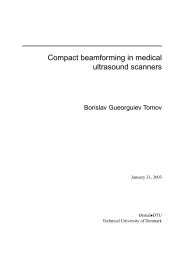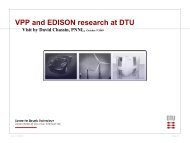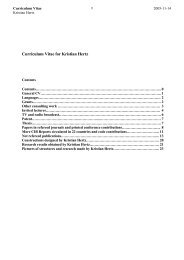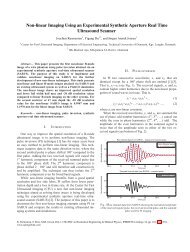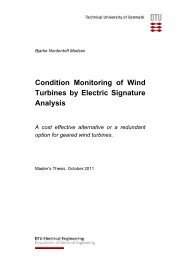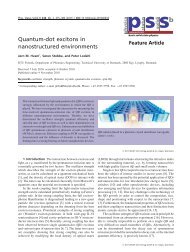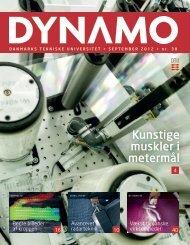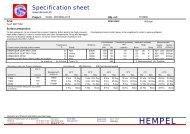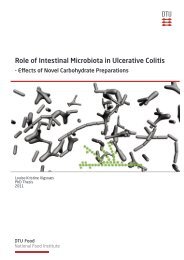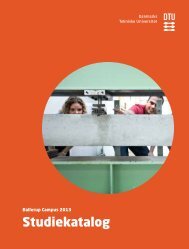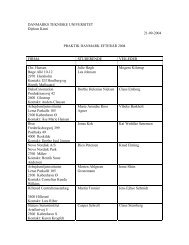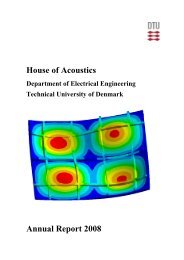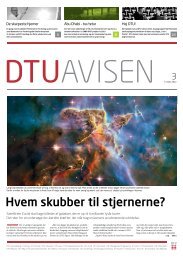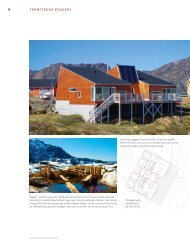MSc programs - DTU
MSc programs - DTU
MSc programs - DTU
Create successful ePaper yourself
Turn your PDF publications into a flip-book with our unique Google optimized e-Paper software.
22<br />
Electrical Engineering<br />
<strong>MSc</strong> in Electrical Engineering<br />
Semesters: 4<br />
Study credits: 120 ECTS<br />
Start: September 2007<br />
Seats: 60<br />
Application date: March 15 or June 1, 2007<br />
Electrical engineering is fundamental to many technologies that strongly influence the develop-<br />
ment of modern society. From electrical power generation and distribution over electronic devices<br />
and equipment to wireless communication, electrical engineering is at the heart of everyday<br />
technologies in our professional as well as our private lives. <strong>DTU</strong> covers several areas of electrical<br />
engineering as witnessed by the three associated <strong>MSc</strong> <strong>programs</strong> in Space Technology, Wind Energy<br />
and Wireless Engineering as well as the four recommended study lines listed below.<br />
The <strong>MSc</strong> program in Electrical Engineering gives you the opportunity to work at all levels from<br />
theory and methods over components and systems to applications. The courses range from highly<br />
theoretical to highly practical including experimental work in advanced laboratories. Your final<br />
<strong>MSc</strong> thesis project will either be linked closely to on-going research at <strong>DTU</strong> and/or be carried out in<br />
cooperation with a company outside <strong>DTU</strong>.<br />
The M.Sc. program in Electrical Engineering is anchored in the Ørsted·<strong>DTU</strong> department but includes<br />
courses from other <strong>DTU</strong> departments. The program is research-based and application-driven - often<br />
in close cooperation with other universities, research organizations and industry.<br />
Study lines: Acoustics<br />
Automation and Robot Technology<br />
Electric Power Engineering<br />
Physical Electronics<br />
Career opportunities: The electrical engineering degree is well recognized and<br />
job opportunities are plenty in private companies as<br />
well as public organizations. Furthermore, there are<br />
opportunities for excellent <strong>MSc</strong> graduates to pursue a<br />
PhD program at <strong>DTU</strong>.<br />
Prerequisites: BSc degree in electrical engineering or another relevant field.<br />
Good qualifications in fundamental mathematics, physics,<br />
and electrical, electronic and electromagnetic engineering.<br />
Program coordinator: Professor Olav Breinbjerg (ob@oersted.dtu.dk)<br />
Department: Ørsted·<strong>DTU</strong><br />
Read more: www.dtu.dk and www.oersted.dtu.dk<br />
<strong>MSc</strong> in Wind Energy – Electrical<br />
Semesters: 4<br />
Study credits: 120 ECTS<br />
Start: September 2007<br />
Seats: 60<br />
Application date: 15 March or June 1, 2007<br />
Wind power is a successful technology of steadily increasing importance. Wind energy installed<br />
throughout the world generates the equivalent electricity need of 47 million Europeans. And this<br />
is just the beginning. In 2020 wind power can deliver 12% of the global electricity demand, create<br />
2.3 million jobs and make a substantial contribution to reduce CO2 emissions. The <strong>MSc</strong> program is<br />
Wind Energy Electrical is based on Danish front knowledge and technology, combining scientific research<br />
and knowledge with teaching and guidance from a large number of associated experts and<br />
researchers from industry. <strong>DTU</strong> is a world leading university within wind energy technology and has<br />
been engaged in wind energy research and education since the 1970’s. Since 2001, the university<br />
has offered a dedicated <strong>MSc</strong> program in wind power.<br />
The objective of the <strong>MSc</strong> specialization in wind energy is to give you a general understanding of<br />
wind energy systems and a deep insight in and knowledge about electrical technologies related to<br />
wind energy qualifying you to analyze, design, develop and operate wind energy systems. You get<br />
the possibility of contributing to the global development, and you will have a wide range of job opportunities<br />
at technology providers such as wind turbine manufacturers and subcontractors, energy<br />
companies, utility companies, developers, consultancies and research companies. Furthermore,<br />
you have the possibility of supplementing with a broad variety of knowledge on eg aerodynamics,<br />
wind turbine construction, control, prognosis and optimization. The specialization provides you<br />
with extensive knowledge on wind turbine technology and specialized knowledge and skills within<br />
several electrical key technologies of wind power. Key elements in the specialization cover electrical<br />
design of wind turbines including generator and power electronics, grid connection and integration<br />
of wind power in the electric power system. The specialization covers the electrical system of the<br />
individual wind turbine as well as the electrical and control aspects of interaction between the<br />
wind turbines and the electric power system.<br />
The specialization in wind energy (electrical engineering) is offered in close collaboration with the<br />
specialization in wind energy (mechanical engineering). Several activities and courses are common<br />
for the two specializations. Besides, the two specializations are coordinated with common elective<br />
courses. In this way it is possible to obtain cross-disciplinary knowledge on a wide range of wind<br />
power technologies.<br />
Career opportunities: Technology providers like wind turbine manufacturers and<br />
subcontractors, energy companies, utility companies, developers,<br />
consultancies and research companies.<br />
Prerequisites: BSc degree in electrical engineering, mechanical engineering or other<br />
relevant academic background. Skills within at least one of the following<br />
subjects: Powersystem analysis and design, Power system management<br />
and control, Electric machinery, Power electronics, Automation, High voltage<br />
engineering, Testing and measuring techniques, Material science and<br />
electrical experimental.<br />
Programme coordinator: Professor Jacob Østergaard<br />
Department: Ørsted•<strong>DTU</strong>, http://www.oersted.dtu.dk<br />
Read more: www.oersted.dtu.dk



